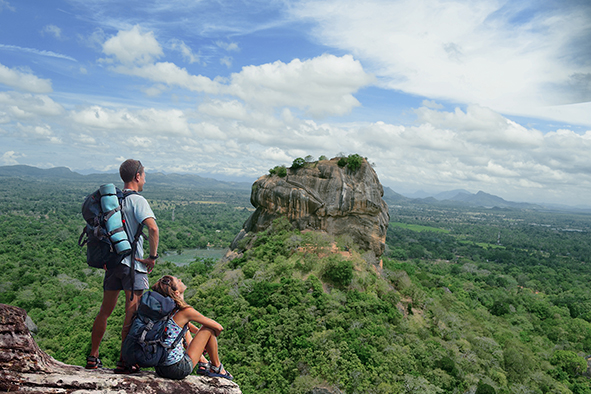Certificate Course in Cultural Tourism
The Postgraduate Institute of Archaeology, Sri Lanka's prime institution in the field of archaeology and cultural heritage in Sri Lanka, introduced a certificate course in cultural tourism for the benefit of those who are engaged in the tourism sector and those who are hoping to enter the sector. The main objective of this course is to provide updated knowledge to introduce Sri Lanka through its divers archaeological, cultural, and environmental heritage. The second goal of the institute is to contribute the development of the country through its research and findings. This certificate course has been presented to you as the basic step of a more advance educational program on cultural tourism introduce soon.
-
Duration: 6 Months
-
Medium: English and Sinhala
-
Number of Credits: 3 credits
-
Lecturing: On Classroom & Distance Learning (Zoom)
Introduction to Tourism
Course Code: CCCT 201
Course Content:
- History of Travel and Tourism - Worldwide
- History of Tourism – Sri Lanka
- Types of Tourism
- Current Situation of the World Tourism Industry
- Recent trends in the Sri Lankan Tourism Industry
Learning Outcomes: By the end of the course unit, the student will be able to demonstrate knowledge and an understanding of the global concepts of tourism and the nature of tourism and new trends in tourism in Sri Lanka
Method of Teaching and Learning: Lectures, tutorials, discussions, power point presentations and field Studies
Assessment: end of course written MCQ and /or structural essays and /or Assignments
Culture and Heritage in Sri Lanka
Course Code: CCCT 202
Course Content:
- 01. Introduction to Culture
- Introduction to Heritage
- Heritage Assessment and Heritage Values
- Introduction to Tangible and Intangible Culture
- History of Sri Lanka – a short introduction
- Cultural Heritage of Sri Lanka : Buddhist Culture
- Cultural Heritage of Sri Lanka : Hindu Culture
- Cultural Heritage of Sri Lanka : Muslim Culture
- Cultural Heritage of Sri Lanka : Catholic Culture
- Cultural Heritage of Sri Lanka : Dutch Architecture
- Major Prehistoric Sites in Sri Lanka
- Major Proto historic Sites in Sri Lanka
- Major Heritage Sites in Sri Lanka : Anuradhapura & suburbs
- Major Heritage Sites in Sri Lanka : Pollonnaruwa & suburbs
- Major Heritage Sites in Sri Lanka : Southern Province
- Major Heritage Sites in Sri Lanka : Thissamaharamaya & suburbs
- Major Heritage Sites in Sri Lanka : Sigiriya & suburbs
- Major Heritage Sites in Sri Lanka : Kandy & suburbs
- Major Heritage Sites in Sri Lanka : Jaffna & suburbs
- Major Heritage Sites in Sri Lanka : Trincomalee & suburbs
- Intangible Heritage in Sri Lanka: Traditional Dancing and other performing Arts
- 22 Intangible Heritage in Sri Lanka: Music and Folk Songs
- Intangible Heritage in Sri Lanka: Sri Lankan Murals Tradition
- Intangible Heritage in Sri Lanka: Ritual Practices and Customs
- Intangible Heritage in Sri Lanka: Tradional Crafts
- Intangible Heritage in Sri Lanka: Buddhist meditation tourism
- Heritage and Tourism
- Cave Tourism
- Ancient Irrigation Heritage in Sri Lanka
- Ancient Metallography Technology in Sri Lanka
- Indigenous Tourism
Learning Outcomes: By the end of the course unit, the student will be able to demonstrate knowledge and an understanding of the concept of culture and Heritage and nature of the cultural tourism with special reference to Sri Lanka
Method of Teaching and Learning: Lectures, tutorials, discussions, power point presentations and field Studies
Assessment: end of course written MCQ and /or structural essays and /or Assignments
Cultural Tourism in Sri Lanka
Course Code: CCCT 203
Course Content:
- Relationship between Culture and Tourism
- Concept of World Heritage and World Heritage sites in Sri Lanka
- The Role of Major Tourism Institutions in Sri Lanka
- Tourist Board
- Legislations and Ordinance for Cultural Tourism in Sri Lanka
- Museums and Cultural Tourism
- Museums Marketing for Cultural Tourism
- Impact of Cultural Tourism
- Managing Cultural Tourism
- Relationship between Cultural Tourism and Eco tourism
- New trends in Cultural Tourism
Learning Outcomes: By the end of the course unit, the student will be able to demonstrate knowledge and an understanding of the environment of cultural Tourism in Sri Lanka and nature of the legal background and managing and planning in cultural Tourism
Method of Teaching and Learning: Lectures, tutorials, discussions, power point presentations and field Studies
Assessment: end of course written MCQ and /or structural essays and /or Assignments
The applications can be obtained from the Administration office of the PGIAR
Duly completed applications should be sent to:
The Assistant Registrar (Academic),
Post Graduate Institute of Archaeology
407, Bauddhaloka Mawatha,
Colombo 07.
Please indicate “CERTIFICATE COURSE IN CULTURAL TOURISM” on the top left-hand corner of the envelope.
Online application
|
Registration fee |
Rs. 1000 |
|
Total Course Fee |
Rs. 40,000 |

